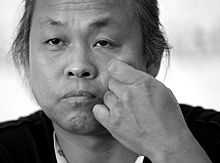Kim Ki-duk (Hangul: 김기덕 Korean pronunciation: [kimɡidʌk]; born December 20, 1960) is a South Korean filmmaker noted for his idiosyncratic "art-house" cinematic works. His films have received many distinctions in the festival circuit. He is not related to the Kim Ki-duk who directed Yonggary in the 1960s. He has given scripts to several of his former assistant directors including Juhn Jai-hong (Beautiful and Poongsan) and Jang Hoon (Rough Cut).
Biography
Kim Ki-duk was born on December 20, 1960 in Bonghwa, North Gyeongsang Province, South Korea. He studied fine arts in Paris from 1990 to 1993. After returning to South Korea, Kim began his career as a screenwriter and won the first prize in a scenario contest held by Korean Film Council in 1995.[1] In the following year, Kim made his debut as a director with a low budget movie titled Crocodile (1996). The film received sensational reviews from movie critics in South Korea. His 2000 film Real Fiction was entered into the 23rd Moscow International Film Festival.[2]
In 2004, he received Best Director awards at two different film festivals, for two different films. At the Berlin International Film Festival, he was awarded for Samaritan Girl (2004), and at the Venice Film Festival he won for 3-Iron (also 2004). In 2011, his documentary film Arirang received an award for best film in the Un Certain Regard category from the Cannes Film Festival. In 2012, his film Pieta received the Golden Lion award at the Venice Film Festival, the first Korean film to receive a "best film" honor at one of the top three international film festivals - Venice, Berlin and Cannes.
Controversy
The British Board of Film Classification delayed the release of Kim Ki-duk's The Isle (2000) in the United Kingdom because of instances of animal cruelty in the film. Concerning scenes in which a frog is skinned alive and fish are mutilated, the director stated, "We cooked all the fish we used in the film and ate them, expressing our appreciation. I've done a lot of cruelty on animals in my films. And I will have a guilty conscience for the rest of my life."[3]
To a U.S. interviewer who suggested that scenes such as these are "very disturbing and [seem] to place an obstacle to the films [sic] reception, or... distribution, to other countries", Kim said, "Yes, I did worry about that fact. But the way I see it, the food that we eat today is no different. In America you eat beef, pork, and kill all these animals. And the people who eat these animals are not concerned with their slaughter. Animals are part of this cycle of consumption. It looks more cruel onscreen, but I don't see the difference. And yes, there's a cultural difference, and maybe Americans will have a problem with it - but if they can just be more sensitive to what is acceptable in different countries I'd hope they wouldn't have too many issues with what's shown on-screen."[4]
Filmography
Additional credits
International awards
See also
References
Notes
Bibliography
- Seveon, Julien (2003). "An Interview with Korean Director Kim Ki-duk". Asian Cult Cinema 38 (1st Quarter): pp.49–61.
External links
| Persondata |
|---|
| Name |
Kim, Ki-duk |
| Alternative names |
|
| Short description |
Korean filmmaker |
| Date of birth |
1960-12-20 |
| Place of birth |
|
| Date of death |
|
| Place of death |
|
